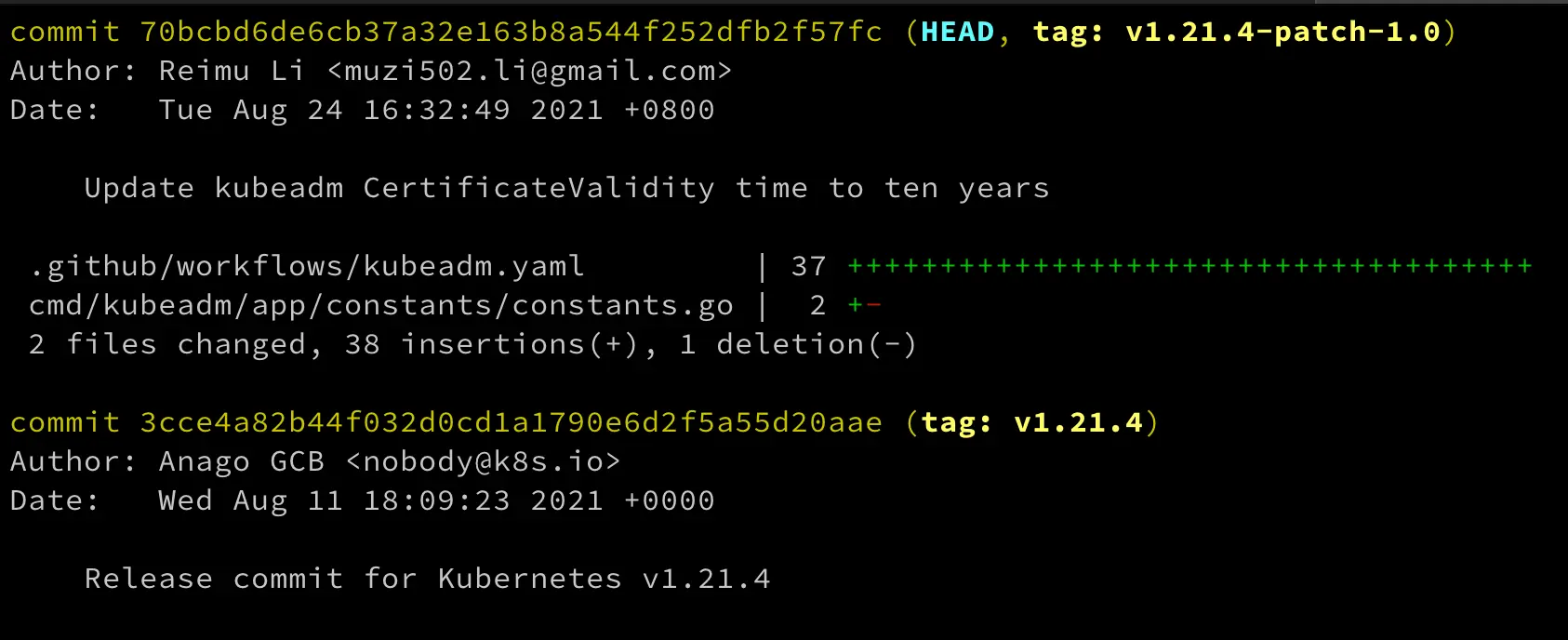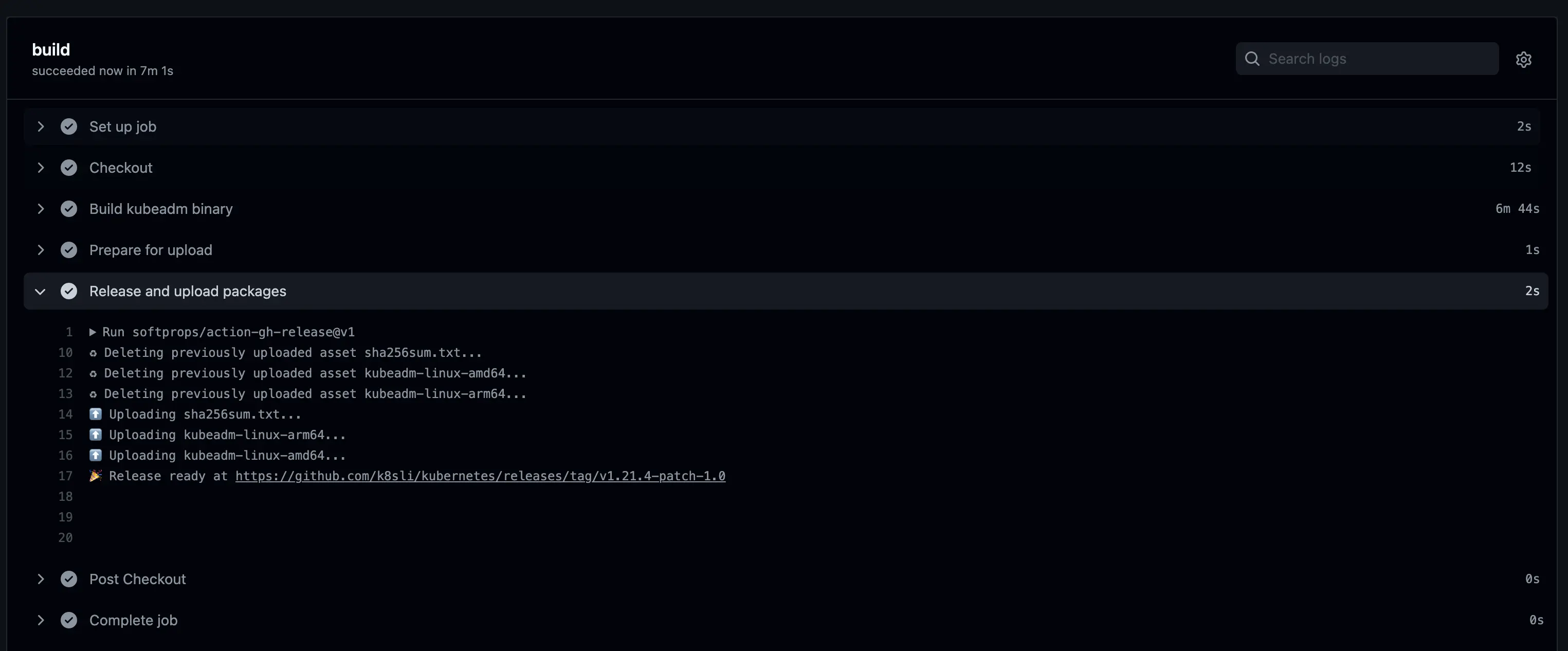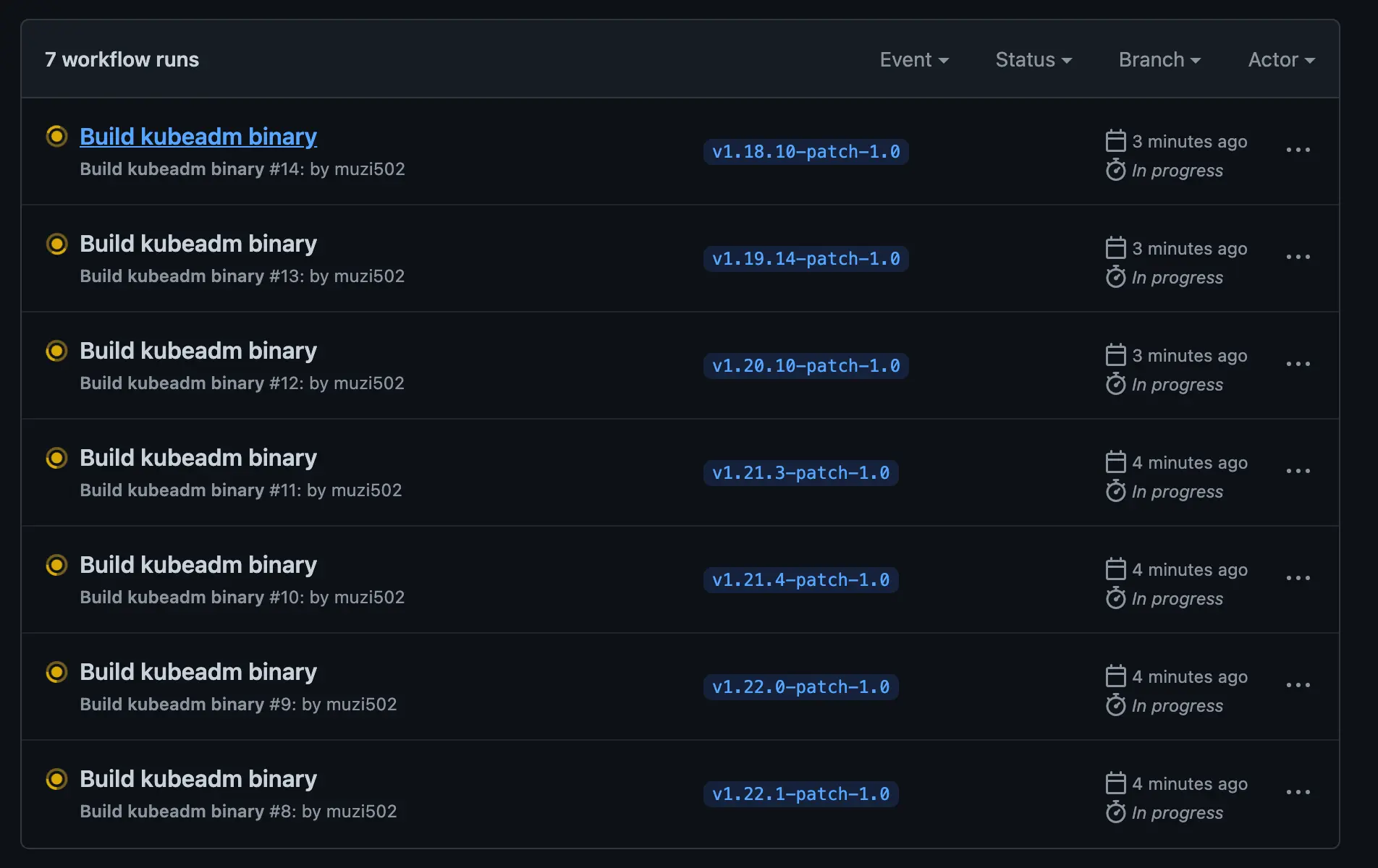When using kubernetes, you often have to modify the official k8s source code and recompile it due to certain needs. This article explains how to use GitHub Actions to compile and publish the generated binaries by modifying the kubeadm generation certificate to the default 10 years.
Build
clone repo
Fork the official kubernetes source code to your own repo
workflow
-
github/workflows/kubeadm.yaml1 2 3 4 5 6 7 8 9 10 11 12 13 14 15 16 17 18 19 20 21 22 23 24 25 26 27 28 29 30 31 32 33 34 35 36 37 38 39 40 41 42--- name: Build kubeadm binary on: push: tag: - 'v*' jobs: build: runs-on: ubuntu-20.04 # Here we choose to trigger the job as a tag if: startsWith(github.ref, 'refs/tags/') steps: - name: Checkout uses: actions/checkout@v2 - name: Build kubeadm binary shell: bash run: | # Run the build/run.sh build script to compile the binaries on the appropriate platform build/run.sh make kubeadm KUBE_BUILD_PLATFORMS=linux/amd64 build/run.sh make kubeadm KUBE_BUILD_PLATFORMS=linux/arm64 # The built binaries are stored in _output/dockerized/bin/ # We name the binary target file according to its system name + CPU architecture name - name: Prepare for upload shell: bash run: | mv _output/dockerized/bin/linux/amd64/kubeadm kubeadm-linux-amd64 mv _output/dockerized/bin/linux/arm64/kubeadm kubeadm-linux-arm64 sha256sum kubeadm-linux-{amd64,arm64} > sha256sum.txt # Use softprops/action-gh-release to upload the build to the GitHub release - name: Release and upload packages uses: softprops/action-gh-release@v1 env: GITHUB_TOKEN: ${{ secrets.GITHUB_TOKEN }} with: files: | sha256sum.txt kubeadm-linux-amd64 kubeadm-linux-arm64 -
build/run.sh: Run a command in a build docker container. Common invocations:
build/run.sh make: Build just linux binaries in the container. Pass options and packages as necessary.build/run.sh make cross: Build all binaries for all platforms. To build only a specific platform, addKUBE_BUILD_PLATFORMS=<os>/<arch>build/run.sh make kubectl KUBE_BUILD_PLATFORMS=darwin/amd64: Build the specific binary for the specific platform (kubectlanddarwin/amd64respectively in this example)build/run.sh make test: Run all unit testsbuild/run.sh make test-integration: Run integration testbuild/run.sh make test-cmd: Run CLI tests
Modify source code
-
cmd/kubeadm/app/constants/constants.goFind the
CertificateValidityvariable and add a 0 to it after 375 days to renew the certificate to 10 years. -
git diff1 2 3 4 5 6 7 8 9 10 11 12 13 14 15 16 17 18 19 20 21 22 23 24 25 26 27 28 29 30 31 32 33 34 35 36 37 38 39 40 41 42 43 44 45 46 47 48 49 50 51 52 53 54 55 56diff --git a/.github/workflows/kubeadm.yaml b/.github/workflows/kubeadm.yaml new file mode 100644 index 00000000000..376f37c0edf --- /dev/null +++ b/.github/workflows/kubeadm.yaml @@ -0,0 +1,37 @@ +--- +name: Build kubeadm binary image + +on: + push: + tag: + - 'v*' +jobs: + build: + runs-on: ubuntu-20.04 + if: startsWith(github.ref, 'refs/tags/') + steps: + - name: Checkout + uses: actions/checkout@v2 + + - name: Build kubeadm binary + shell: bash + run: | + build/run.sh make kubeadm KUBE_BUILD_PLATFORMS=linux/amd64 + build/run.sh make kubeadm KUBE_BUILD_PLATFORMS=linux/arm64 + + - name: Prepare for upload + shell: bash + run: | + mv _output/dockerized/bin/linux/amd64/kubeadm kubeadm-linux-amd64 + mv _output/dockerized/bin/linux/arm64/kubeadm kubeadm-linux-arm64 + sha256sum kubeadm-linux-{amd64,arm64} > sha256sum.txt + + - name: Release and upload packages + uses: softprops/action-gh-release@v1 + env: + GITHUB_TOKEN: ${{ secrets.GITHUB_TOKEN }} + with: + files: | + sha256sum.txt + kubeadm-linux-amd64 + kubeadm-linux-arm64 diff --git a/cmd/kubeadm/app/constants/constants.go b/cmd/kubeadm/app/constants/constants.go index aed3a713020..08a24d237f8 100644 --- a/cmd/kubeadm/app/constants/constants.go +++ b/cmd/kubeadm/app/constants/constants.go @@ -46,7 +46,7 @@ const ( TempDirForKubeadm = "tmp" // CertificateValidity defines the validity for all the signed certificates generated by kubeadm - CertificateValidity = time.Hour * 24 * 365 + CertificateValidity = time.Hour * 24 * 3650 // CACertAndKeyBaseName defines certificate authority base name CACertAndKeyBaseName = "ca"
cherry-pick
After the changes are done on the branch, we will cherry-pick the changes to other tags, here is the example of v1.21.4: cherry-pick the above changes on top of the v1.21.4 tag and re-tag it with a new tag.
-
Get the commit id of the above modification
1$ COMMIT_ID=$(git rev-parse HEAD) -
checkout to v1.21.4 on this tag
1 2 3 4 5 6 7 8 9 10 11$ git checkout v1.21.4 Note: checking out 'v1.21.4'. You are in 'detached HEAD' state. You can look around, make experimental changes and commit them, and you can discard any commits you make in this state without impacting any branches by performing another checkout. If you want to create a new branch to retain commits you create, you may do so (now or later) by using -b with the checkout command again. Example: HEAD is now at 3cce4a82b44 Release commit for Kubernetes v1.21.4 -
Add the modification cherry-pick to the current tag
-
Re-type the new tag, e.g.
v1.21.4-patch-1.0
-
Push tag to repo to trigger workflow
1 2 3 4 5 6 7 8 9 10$ git push origin --tags -f Enumerating objects: 17, done. Counting objects: 100% (17/17), done. Delta compression using up to 4 threads Compressing objects: 100% (9/9), done. Writing objects: 100% (10/10), 1.13 KiB | 192.00 KiB/s, done. Total 10 (delta 7), reused 0 (delta 0) remote: Resolving deltas: 100% (7/7), completed with 7 local objects. To github.com:k8sli/kubernetes.git + c2a633e07ec...baadbe03458 v1.21.4-patch-1.0 -> v1.21.4-patch-1.0 (forced update)
-
The entire build process takes about 7 minutes, which is quite efficient.

Summary
The above only shows the process of building with one tag, if you want to build other versions of kubeadm, you can follow the same process and method. In fact, it is quite simple to write a shell script to handle this, as follows.
|
|

The advantage of using GitHub Actions is that it takes care of code management and product management for us. The built binaries are stored in the GitHub release and are easy to download and use, so you don’t have to get a separate machine or storage server, which saves you a lot of labor and maintenance costs.
Reference https://blog.k8s.li/build-k8s-binary-by-github-actions.html